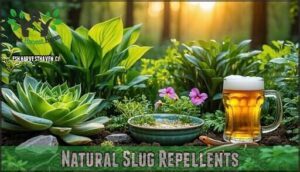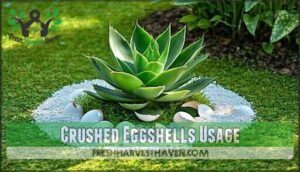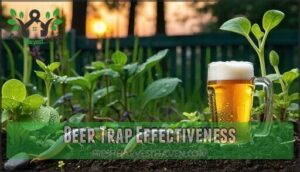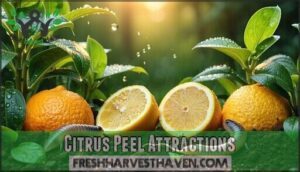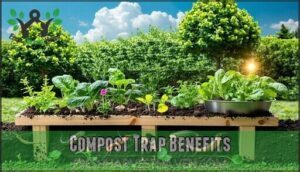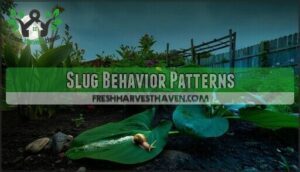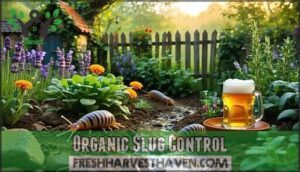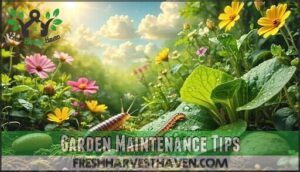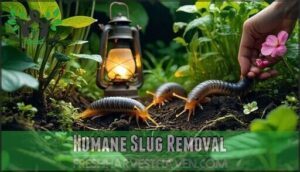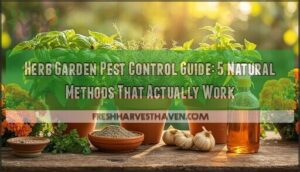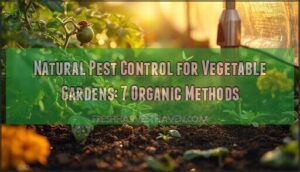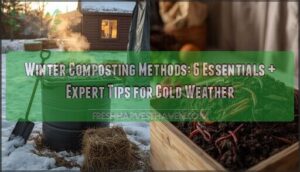This site is supported by our readers. We may earn a commission, at no cost to you, if you purchase through links.
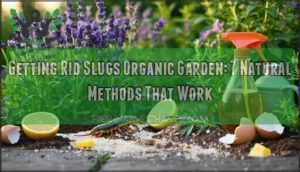
Create aromatic barriers with lavender, rosemary, and sage—these fragrant herbs naturally repel slugs while adding beauty to your space.
Apply crushed eggshells, coffee grounds, or coarse sand around vulnerable plants to create uncomfortable pathways slugs won’t cross.
Set up beer traps or citrus peel lures to capture these nocturnal pests effectively.
Encourage natural predators like birds and toads by providing habitat, and spray garlic solution mixed with water every few days for additional protection.
These time-tested strategies work together like a well-orchestrated defense system, though timing and proper application make all the difference.
Table Of Contents
- Key Takeaways
- Natural Slug Repellents
- Physical Barriers
- Traps and Lures
- Biological Controls
- Slug Behavior Patterns
- Preventative Gardening
- Organic Slug Control
- Garden Maintenance Tips
- Humane Slug Removal
- Frequently Asked Questions (FAQs)
- What is the organic killer for slugs?
- Do coffee grounds really repel slugs?
- How do I stop slugs from eating my veggies?
- How to get rid of slugs in the garden naturally?
- What is a natural slug killer for plants?
- How to keep slugs off strawberry plants organically?
- Can I sprinkle salt in my garden to kill slugs?
- Can slugs climb vertical surfaces like walls?
- How long do slug repellent barriers remain effective?
- Do coffee grounds actually kill slugs?
- Conclusion
Key Takeaways
- Create physical barriers – You can scatter crushed eggshells, coffee grounds, or coarse sand around your plants to form uncomfortable pathways that slugs will not cross.
- Set up effective traps – You will catch more slugs by placing beer traps or citrus peels near vulnerable plants, checking them daily during morning hours when slugs are most active.
- Plant natural repellents – You should grow aromatic herbs like lavender, rosemary, and sage around your garden to create fragrant barriers that naturally deter slugs.
- Encourage beneficial predators – You can attract natural slug hunters by installing bird feeders, creating toad habitats with shallow water sources, and maintaining garden diversity that supports beneficial insects.
Natural Slug Repellents
You don’t need harsh chemicals to keep slugs from turning your garden into their personal salad bar.
Nature provides plenty of effective repellents that work without harming beneficial insects, soil microorganisms, or your family’s health.
You don’t need harsh chemicals to keep slugs from turning your garden into their personal salad bar.
Nature provides plenty of effective repellents that work without harming beneficial insects, soil microorganisms, or your family’s health.
Plant-Based Solutions
Natural slug deterrents transform your garden into a pest-free haven.
Plant extracts from aromatic varieties like lavender, rosemary, and sage create effective green barriers.
Slug repellent plants including fennel and chives reduce damage by 55%.
Botanical controls work as living organic pesticides—foxglove’s toxicity and daylilies’ resistance naturally protect vulnerable crops.
These natural deterrents offer sustainable organic slug control.
Herb Garden Benefits
Your herb garden becomes a powerful ally against slugs while enriching your outdoor space.
Fragrant herbs like rosemary, thyme, and sage create natural barriers that slugs actively avoid.
- Medicinal plants such as lavender release oils that repel slugs naturally
- Aromatic flowers like marigolds complement herbs for enhanced slug control methods
- Garden diversity attracts beneficial insects that prey on slug eggs.
This organic gardening approach combines herbal remedies with practical pest management, transforming your garden into a slug-resistant sanctuary.
Garlic Spray Effectiveness
Pungent garlic spray creates an invisible shield around your plants, making slugs think twice about their midnight snacking adventures.
This natural pest control method works through sulfur compounds that irritate slug sensory organs without harming beneficial insects.
Mix three crushed garlic cloves with one quart water, strain, and apply directly to affected areas.
Three cloves of garlic mixed with water creates nature’s invisible armor against slugs
Organic gardening tips recommend reapplying every 3-4 days or after rain, as moisture dilutes effectiveness.
While garden sprays require consistent maintenance, this non toxic slug control method protects plants safely around children and pets, making it ideal for edible crops.
Seaweed Mulch Advantages
Why settle for ordinary mulch when seaweed mulch delivers triple benefits? This ocean treasure acts as a natural slug deterrent while boosting soil health and providing organic fertilizer properties.
Here’s why seaweed mulch excels in organic gardening tips:
- Rough texture creates uncomfortable barriers that slugs avoid crossing
- Salt content naturally repels these moisture-loving pests
- Rich nutrients improve soil structure and plant liveliness
- Sustainable sourcing supports ecofriendly gardening practices
Spread dried seaweed around vulnerable plants for effective natural pest control and enhanced slug prevention methods.
Physical Barriers
Physical barriers work by making your garden beds uncomfortable for slugs to cross, forcing them to seek easier targets elsewhere.
You can create effective slug deterrents using common household materials like crushed eggshells, coffee grounds, or coarse sand that feel unpleasant against their soft bodies.
Rough Texture Options
Beyond plant-based deterrents, you can create grit barriers using sharp sand, crushed gravel, or bark mulch around vulnerable plants.
Pine needle mulch works exceptionally well, forming acidic, prickly borders that irritate slugs’ soft bodies. Wood chips and coarse materials create uncomfortable pathways they’ll avoid.
Apply these rough textures in continuous rings without gaps for maximum effectiveness. Effective gardeners often utilize commercial grit barrier products to protect their plants from slug damage.
Crushed Eggshells Usage
Transform your breakfast routine into slug deterrents by crushing clean eggshells into sharp fragments.
These eggshell barriers work like nature’s barbed wire—slugs can’t navigate the jagged edges comfortably.
Scatter crushed eggshells around vulnerable plants, creating protective rings that double as calcium supplements for soil enrichment.
This organic slug killer method combines natural deterrents with eco friendly gardening, slowly decomposing into garden mulch while maintaining effective slug barrier methods.
Grit and Gravel Applications
Sharp grit barriers and gravel mulch create natural fortresses around your plants. These texture options work by irritating slugs’ soft underbellies, forcing them to retreat rather than cross uncomfortable terrain.
Consider these effective slug deterrents for your organic garden care:
- Coarse pea gravel – Creates lasting protection with excellent drainage
- Crushed granite chips – Sharp edges provide maximum deterrent effect
- Volcanic rock fragments – Lightweight yet highly effective natural deterrents
Apply two-inch depths around vulnerable plants, replenishing monthly to maintain slug barrier methods effectiveness.
Traps and Lures
When slugs prove too clever for barriers alone, you’ll need to outsmart them with strategic traps and lures.
These methods work by exploiting slugs’ natural behaviors and preferences, turning their nocturnal feeding habits against them.
Beer Trap Effectiveness
While barriers keep slugs away, beer traps actively lure them to their demise. These slug attractants exploit slugs’ natural craving for fermenting yeast, making them irresistible bait effectiveness tools. The volatiles in beer mimic decomposing vegetation that slugs naturally seek.
Your homemade slug trap doesn’t need fancy equipment—any shallow container works. Trap designs matter less than proper placement and maintenance. Studies show beer trap slugs catch 5-6 specimens per trap over 3-4 days, vastly outperforming water-only alternatives.
Here’s how to maximize your beer traps success:
- Position containers flush with soil surface for easy slug access
- Use cheap lager—expensive beer won’t boost slug lures performance
- Place traps 30cm from valuable plants to prevent damage concentration
- Replace beer every 2-3 days to maintain potency
- Check traps during morning hours when slugs remain sluggish
Effective beer trap maintenance involves regular checks and refills using slug control methods.
Getting rid of slugs becomes straightforward when you understand their predictable attraction patterns.
Citrus Peel Attractions
Kitchen scraps become powerful slug lures when you flip citrus peel face-down near vulnerable plants.
Orange, lemon, and grapefruit fruit rinds attract slugs with their aromatic oils, creating effective citrus traps overnight.
These homemade slug repellent stations harness peel extracts that draw pests underneath by morning.
Check your natural slug control setup daily, collecting slugs for humane relocation.
This organic gardening advice transforms waste into working slug repellents.
Sacrificial Plants Usage
Smart gardeners plant decoy crops like lettuce, cabbage, or mustard greens as sacrificial plants to draw slugs away from prized vegetables.
These bait vegetation plantings create effective lure gardens that redirect slug feeding behavior.
Position your trap plants 10-15 feet from main crops, creating sacrificial greens that protect valuable harvests through strategic distraction.
Compost Trap Benefits
Beyond simple plant diversions, compost traps combine Waste Reduction with effective slug control through strategic Organic Matter placement.
These designs transform kitchen scraps into powerful attraction systems while supporting Soil Health. Effective compost trap systems can be implemented to maximize slug capture rates.
- Simple Construction – Layer vegetable scraps under boards, creating irresistible slug magnets
- Cost-Effective Solutions – Transform kitchen waste into organic slug baits without purchasing materials
- Maintenance Benefits – Check traps daily for captured slugs while enriching organic garden maintenance
Biological Controls
Nature provides powerful allies in your slug battle through beneficial nematodes and predator-friendly habitats.
You’ll harness microscopic warriors and attract natural hunters that turn slug control into an ecosystem balance rather than endless warfare, utilizing ecosystem balance to achieve this goal.
Nematode Applications
When conditions align perfectly, these microscopic biological agents become your garden’s secret weapon against slugs.
Nature’s tiny soldiers work tirelessly beneath the soil, hunting slugs with microscopic precision
Nematode types like Phasmarhabditis hermaphrodita penetrate slug mantles, releasing fatal bacteria that achieve 90% mortality rates within three weeks.
| Nematode Types | Soil Treatment Timing | Microbe Balance |
|---|---|---|
| P. hermaphrodita | Early spring/autumn | Maintains beneficial fauna |
| P. californica | March-October (above 5°C) | Preserves earthworms |
| Nemasys formula | Cool, moist periods | Supports garden ecology |
Apply one million nematodes per 40 square meters for effective parasite control.
These biological agents remain active for six weeks, continuously targeting new slugs entering treated areas while supporting organic garden maintenance through natural slug control methods.
Natural Predator Attraction
Attracting natural predators creates a powerful organic pest control system that works while you sleep.
These beneficial creatures become your garden’s security team, patrolling for slugs and other pests without chemicals.
Here’s how to roll out the welcome mat:
- Install bird feeders and nest boxes to encourage slug-eating birds like thrushes and robins
- Create toad habitat with shallow water sources and rock piles for shelter
- Plant native flowers to attract ground beetles and other beneficial insects
Your garden transforms into a wildlife sanctuary where predators naturally maintain slug populations through garden biodiversity.
Duck and Bird Benefits
Ducks and feathered friends serve as nature’s cleanup crew, devouring hundreds of slugs daily while fertilizing your soil.
These fowl guardians patrol gardens efficiently, especially during dawn and dusk when slugs emerge.
Bird feeders and shallow water dishes attract diverse avian helpers, creating natural pest control.
Your garden wildlife becomes an army of bird predators working around the clock against slug invasions.
Toad House Encouragement
Creating Toad Habitat transforms your garden into a slug-fighting fortress with natural allies. These amphibian heroes consume hundreds of slugs weekly, making them invaluable Frog Friends for organic pest management.
Garden Toads need proper Toad Shelter to establish permanent residence in your growing space. You’ll find that broken clay pots work perfectly as ready-made homes – simply flip them over and chip a small entrance hole. This Wildlife Support creates the cool, damp environment toads crave while providing security from predators.
Strategic placement makes all the difference for successful wildlife attraction. Position your toad houses near water sources, compost areas, or shaded garden corners where moisture naturally collects.
- Design basics: Use inverted broken clay pots with 2-inch entrance holes for ideal natural slug control
- Prime locations: Place near water features, compost piles, or under established shrubs
- Material options: Clay pottery, stacked stones, or wooden boxes create effective garden wildlife shelters
- Maintenance routine: Keep entrances clear and add shallow water dishes for hydration needs
Slug Behavior Patterns
Understanding how slugs behave helps you target their weaknesses and protect your plants more effectively.
These nocturnal creatures leave behind telltale signs that reveal their feeding patterns, preferred hiding spots, and peak activity times, which can be used to understand their behavior and protect plants.
Feeding Habits
Slugs embrace nocturnal feeding patterns, emerging after dark when moisture levels peak.
Their feeding patterns reveal opportunistic behavior—they’ll devour tender seedlings overnight while avoiding tougher, established plants.
Understanding slug diet preferences helps predict damage locations.
These mollusks practice leaf shredding with their rasping mouthparts, contributing to garden decomposition role while simultaneously destroying your prized vegetables through persistent slug feeding habits.
Effective slug management strategies are essential to protecting vegetable crops from slug infestations.
Damage Signs
Spotting slug damage early saves you a world of frustration. If you wake up to plants with jagged leaf holes, shredded seedling edges, or missing foliage, it’s likely a slug infestation is at play.
Their nighttime feeding patterns leave behind garden symptoms you can’t ignore. Here’s what to watch for:
- Large, irregular leaf holes on tender plants
- Seedlings reduced to bare stems
- Chewed edges on leaves
- Sudden disappearance of young transplants
Act fast—your garden’s safety depends on sharp slug identification and quick garden slug removal.
Slimy Trail Indicators
Those telltale silvery paths across your garden aren’t just random streaks—they’re slug highways revealing exactly where these pests travel and feed.
Slug trails function like breadcrumbs, showing you the complete story of nocturnal slug behavior.
These silvery paths contain mucus proteins that create distinctive shine, making slug identification easier during morning inspections.
Fresh moisture signs appear wet and glistening, while older trails dry into persistent streaks that remain visible for days.
Understanding these soil marks helps you assess slug infestation severity and plan targeted organic control strategies:
- Trail composition: Silver mucus proteins create unmistakable shine under natural light
- Navigation patterns: Slugs follow existing routes, establishing permanent garden highways
- Freshness indicators: Wet trails signal recent night activity, dry streaks show older movement
- Population density: Multiple overlapping paths indicate heavy slug damage requiring immediate action
- Persistence factor: Dried mucus remains visible for several days, providing ongoing slug behavior intelligence
These natural GPS systems help you track movement patterns and identify problem areas before extensive slug damage occurs.
Effective slug control methods are essential for maintaining a healthy garden ecosystem.
Nighttime Activity
Under darkness, nocturnal slugs begin their destructive journey across your garden.
Night feeding peaks between 10 PM and 4 AM when humidity soars and temperatures drop.
Slug movement accelerates during moonlight activity, making flashlight patrols your best weapon for handpicking slugs.
Dark habitats under logs and stones become staging areas before their midnight raids.
This timing knowledge transforms your natural slug control strategy—you’ll catch more pests in one nighttime session than weeks of daytime slug management.
Preventative Gardening
Prevention beats reaction in the context of slug management in your organic garden.
You’ll save time and plants by creating conditions that naturally discourage these slimy visitors rather than battling established populations later, which is why prevention is key to successful slug management, and it is also about discourage.
Moisture Reduction
Three smart Water Management strategies can slash your slug population by making your garden less inviting.
Morning Watering around 8-9 AM gives soil time to dry before these night crawlers emerge for their midnight snacking sessions.
Drip Irrigation delivers water directly to roots while keeping foliage dry – slugs hate dry surfaces.
Proper Soil Drainage prevents waterlogged conditions that create slug paradise.
- Install drip irrigation systems targeting plant roots directly
- Water early morning instead of evening hours
- Improve garden drainage with raised beds or soil amendments
- Use Dry Mulching alternatives like gravel instead of moisture-retaining materials
Weed Control Methods
Weeds aren’t just garden eyesores—they’re slug hideouts that sabotage your natural slug control efforts.
Garden sanitation starts with removing these refuges through strategic weed suppression. Hand-pulling weeds paired with mulch management eliminates hiding spots while maintaining organic pest control standards.
Soil preparation through cultivation disrupts weed establishment, and crop covering prevents new growth. These garden pest management techniques create inhospitable conditions for slugs without chemicals.
Regular hoeing and slug control methods like removing debris keep your garden clean and slug-free naturally.
Resistant Plant Varieties
Building your defense against slugs starts with choosing the right plant varieties that naturally repel these garden pests.
Fragrant Herbs like rosemary and lavender contain aromatic oils that slugs actively avoid.
Fuzzy Leaves on plants such as lamb’s ear create uncomfortable textures for soft slug bodies.
Bitter Plants including most ornamental grasses taste unpalatable to feeding slugs.
Thorny Stems found on roses and barberry provide physical deterrents.
Hardy Flowers like dianthus and astilbe resist slug damage through tough leaf structures.
- Slug resistant plants reduce garden maintenance time substantially
- Slugrepelling plants create natural barriers without chemicals
- Slugresistant gardening saves money on pest control products
- Slugproof plants establish long-term protection zones
- Plant selection determines your garden’s vulnerability level
Using slug resistant plants is a key strategy in preventative gardening.
Crop Rotation Benefits
You’re already choosing resistant plants wisely—now maximize your organic gardening strategy with crop rotation.
This farm planning technique disrupts slug life cycles by relocating their favorite meals annually.
Crop diversity confuses these pests while boosting soil health through nutrient cycling.
Your garden ecosystem becomes more resilient, delivering better yield increase and natural pest deterrents that keep slugs guessing.
Effective use of soil health techniques can further enhance the benefits of crop rotation in your garden.
Organic Slug Control
When slugs turn your garden into their personal salad bar, it’s time to fight back with organic methods that actually work.
You’ll discover effective trapping techniques, natural barriers, plant-based repellents, and safe baiting strategies that protect your crops without harming beneficial insects or soil health.
Trapping Methods
Position beer traps and bait stations near slug trails for maximum effectiveness. Use shallow dishes filled with beer or create pitfall traps with cat food as slug lures.
Check slug traps daily and refresh bait regularly. Trap crops like lettuce work as decoys, drawing slugs away from prized plants.
This natural slug control method lets you relocate captured slugs humanely rather than using lethal slug control options. Effective organic pest control methods also involve maintaining a balanced ecosystem to prevent infestations.
Barrier Techniques
Physical barriers stop slugs cold by creating uncomfortable surfaces they won’t cross.
These slug proof barriers work like tiny obstacle courses for soft-bodied pests.
- Copper tape around containers creates mild electrical resistance that deters slugs instantly
- Eggshell borders form jagged natural barriers while enriching soil with calcium
- Grit paths using crushed shells or coarse sand make travel uncomfortable
- Seaweed mulch provides rough textures plus salt content that repels effectively
These ecofriendly barriers require occasional rejuvenation but offer long-term protection without chemicals.
Repellent Options
Natural deterrent-arsenal includes copper tape around containers, creating electrical barriers slugs won’t cross.
Coffee grounds scattered near plants offer dual-purpose slug repellent plus soil enhancement.
Eggshells barrier creates uncomfortable terrain these soft-bodied pests avoid.
Seaweed mulch delivers salt-based deterrence while enriching soil.
Vapor rub applied to pot rims creates slippery surfaces for effective organic pest control using ecofriendly methods.
Safe Bait Handling
When using organic baits like iron phosphate for natural slug control, you’ll want to follow proper bait safety protocols.
Store all organic baits in sealed containers away from children and pets – even iron phosphate can cause stomach upset if ingested in large quantities.
Apply bait placement strategically under boards or pots to minimize non-target exposure while maximizing effectiveness against slugs.
Remember, these handling tips guarantee your pest management strategies remain both safe and successful.
Garden Maintenance Tips
Your garden’s cleanliness directly impacts slug populations, as these moisture-loving mollusks thrive in cluttered, debris-filled spaces.
Consistent maintenance practices like regular hoeing, debris removal, and rejuvenating organic repellents create an environment where slugs can’t establish their slimy territories.
Regular Cleaning
Beyond proper tool sanitization comes garden cleanup – your frontline defense against slug invasions.
Think of slugs as nature’s cleanup crew gone rogue; they’ll feast on any debris you leave behind.
Daily Weeding and Morning Inspection routines catch problems early:
- Garden Raking removes fallen leaves and rotting fruit that shelter slug families
- Debris Clearance eliminates hiding spots under boards, stones, and plant waste
- Soil Sanitization through regular cultivation disrupts egg-laying sites
This garden health maintenance approach beats reactive treatments every time.
Hoeing Techniques
Weekly hoeing during peak growing season disrupts slug hideouts while preparing your soil for ideal plant health.
Choose sharp-edged weeding tools like stirrup hoes or garden rakes for precise cultivation at 1-2 inch depths.
This soil aeration technique eliminates weed competition that harbors slugs, making your organic gardening efforts more effective.
Different hoe types serve specific soil prep needs—wheel hoes excel at slug prevention by creating inhospitable surface conditions through consistent soil disturbance.
Debris Removal
Clearing garden pests starts with smart hiding spot reduction—remove fallen leaves, rotting fruit, and debris piles that shelter slugs.
Egg site elimination matters too, so tackle overgrown mulch and dense vegetation.
Tool storage practices and compost pile management prevent breeding grounds, while garden sanitation benefits your organic gardening efforts.
Getting rid of slugs means eliminating their cozy hideouts completely.
Refreshing Repellents
After clearing your garden of debris, maintaining your repellent arsenal becomes your next priority.
Think of natural repellents as your garden’s security system—they need regular rejuvenation to stay effective against these slimy invaders.
Natural repellents work best when you stay consistent with maintenance schedules:
- Essential oils and herbal teas lose potency after 3-4 days, requiring weekly reapplication
- Vinegar sprays need rejuvenation after each rainfall to maintain acidity levels
- Citrus peels should be replaced when they start browning or drying out
- Diatomaceous earth barriers require immediate renewal after getting wet
- Spice power treatments (like cayenne) need weekly touch-ups for maximum effectiveness
Your organic pest control strategy depends on this maintenance routine—neglected repellents become slug highways rather than barriers.
Humane Slug Removal
When other methods aren’t working, sometimes you need to take matters into your own hands—literally.
Hand-picking slugs during their evening feeding frenzy or early morning activity gives you direct control over your garden’s slug population without harming beneficial insects or soil organisms.
Hand Picking Methods
Nightly patrol is your most effective weapon against garden slugs. Peak activity occurs between 8 PM and 2 AM when slug density reaches maximum levels.
Gloves needed for protection while collecting these slimy invaders. Focus on efficient collection using tongs or containers filled with soapy water.
Target moist, shaded areas where slug infestation control matters most. Don’t forget egg removal from clutches hidden under debris—this handpicking strategy delivers superior organic pest control results.
Board Trapping Techniques
Through strategic Board Placement in damp garden areas, you’ll create irresistible slug hideouts.
Choose Optimal Wood like untreated pine or cedar boards, avoiding chemically treated lumber.
Bait Enhancement with lettuce scraps underneath doubles trap effectiveness for organic pest control.
Daily Trap Maintenance and Slug Collection prevents population explosions.
Slugs thrive in these conditions, with peak activity between 5°C-20°C.
This simple pest management technique complements natural predators perfectly, offering gardeners reliable organic methods without harsh chemicals or complicated setups.
Relocation Methods
Compassion drives effective slug relocation in organic pest control. When getting rid of slugs humanely, you’re balancing natural predators with ethical concerns while maintaining survival rates.
Choose ideal habitats carefully:
- Wooded areas with fallen logs and leaf litter
- Compost piles away from vegetable gardens
- Shaded creek beds with consistent moisture
- Wild meadows where slug predators naturally hunt
Release distance matters—relocate at least 50 feet from your garden. Legal aspects rarely apply to slug relocation, but check local wildlife regulations first.
Iron Phosphate Baits
Most organic gardeners discover iron phosphate baits offer effective slug control without harming pets or wildlife.
These organic solutions work by stopping slugs from feeding, causing them to retreat and die naturally. Scatter pellets lightly around affected plants for maximum bait effectiveness.
Consider these factors when using iron phosphate baits:
- Pet Safety: Unlike metaldehyde baits, iron phosphate remains safe around children and animals
- Application Methods: Apply thin, even coverage rather than piles for better slug contact
- Environmental Impact: Breaks down naturally into soil nutrients, supporting sustainable gardening
- Bait Longevity: Remains effective for weeks, even after light rain exposure
- Sluggo Alternatives: Many organic remedies like coffee grounds and crushed eggshells complement iron phosphate treatments
Frequently Asked Questions (FAQs)
What is the organic killer for slugs?
Ironically, the gentlest mollusk killers work best.
Iron phosphate baits effectively eliminate slugs without harming pets, wildlife, or beneficial insects.
You’ll find these organic pellets break down into soil nutrients after slugs consume them, making them a gentle solution.
Do coffee grounds really repel slugs?
Coffee grounds do repel slugs effectively through their rough texture and caffeine content.
You’ll find them most successful when scattered around vulnerable plants, creating an uncomfortable barrier slugs won’t cross easily, utilizing the grounds as a natural repel.
How do I stop slugs from eating my veggies?
Like armor protecting your castle, create barriers that slugs can’t breach.
Scatter crushed eggshells, coffee grounds, or diatomaceous earth around vulnerable plants.
Water early morning, remove hiding spots, and encourage natural predators like birds and toads.
How to get rid of slugs in the garden naturally?
You’ll banish those slimy invaders by sprinkling crushed eggshells and coffee grounds around plants.
Setting beer traps, and watering gardens early morning so soil dries before nightfall when they’re most active.
What is a natural slug killer for plants?
Iron phosphate slug baits eliminate up to 90% of slugs within days.
You’ll find this organic compound naturally occurs in soil, making it safe for pets and beneficial insects while effectively targeting mollusks through stomach poison action.
How to keep slugs off strawberry plants organically?
Protect your strawberry plants by surrounding them with crushed eggshells or coffee grounds, which create uncomfortable barriers.
Water early morning, use copper tape around beds, and encourage natural predators like ground beetles.
Can I sprinkle salt in my garden to kill slugs?
Don’t put all your eggs in one basket—salt kills slugs but also harms plants and soil.
It dehydrates beneficial organisms, increases soil salinity, and damages root systems, making it unsuitable for organic gardens.
Can slugs climb vertical surfaces like walls?
Yes, slugs can climb vertical surfaces like walls, fences, and plant stems.
They’ll use their muscular foot and slime trail to scale smooth surfaces, making copper barriers around raised beds essential defenses.
How long do slug repellent barriers remain effective?
Like Rome wasn’t built in a day, slug barriers don’t last forever.
Crushed eggshells and coffee grounds need replenishment after heavy rain or watering.
Copper tape maintains effectiveness for months, while diatomaceous earth requires reapplication weekly during wet conditions.
Do coffee grounds actually kill slugs?
Coffee grounds don’t actually kill slugs—they simply repel them.
The rough texture and caffeine content make slugs uncomfortable, encouraging them to find easier paths around your plants rather than eliminating them entirely, which is due to the caffeine content.
Conclusion
Mastering getting rid of slugs with organic garden techniques transforms your backyard battleground from slug paradise into fortress paradise.
You’ve armed yourself with crushed eggshells, beer traps, and aromatic herb allies that’ll make those slimy invaders think twice before munching your prized petunias.
Combining physical barriers with biological controls creates sustainable protection that keeps working season after season.
Remember, consistency beats perfection—refresh your defenses regularly and you’ll enjoy slug-free harvests without compromising your organic principles.
- https://learn.eartheasy.com/guides/natural-slug-control/
- https://starofnature.org/organic-garden-how-to-get-rid-of-slugs-without-chemicals/
- https://sweetlifeandlemons.com/how-to-get-rid-of-slugs-in-your-garden-the-natural-way/
- https://pnwhandbooks.org/insect/ipm/slug
- https://www.reddit.com/r/GardeningUK/comments/1j3l99r/why_i_think_the_most_popular_slug_barrier_is_far/

